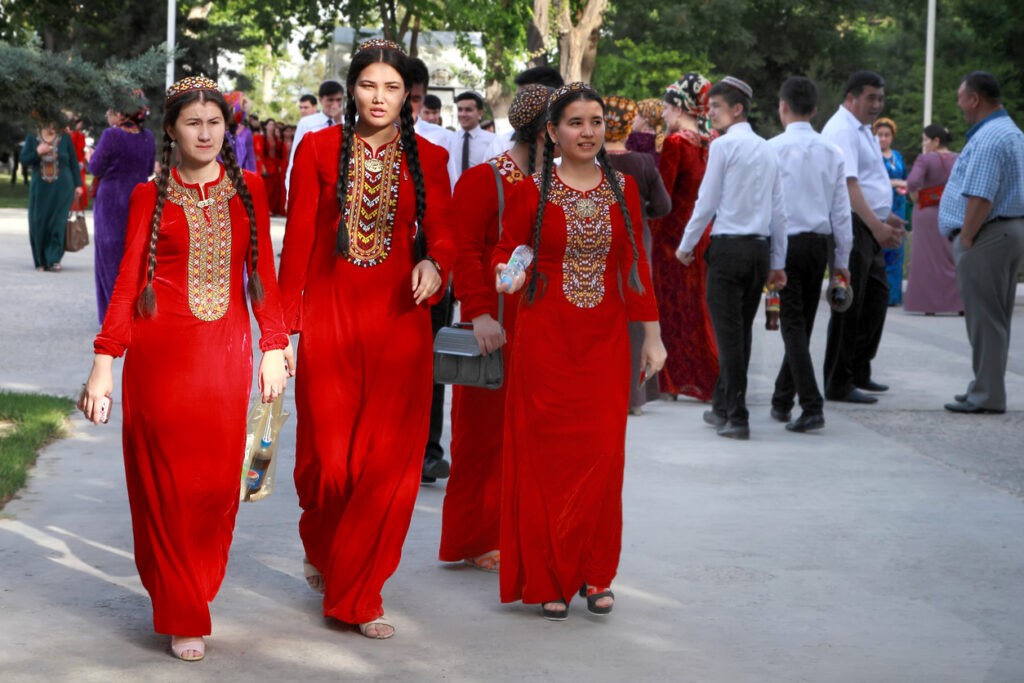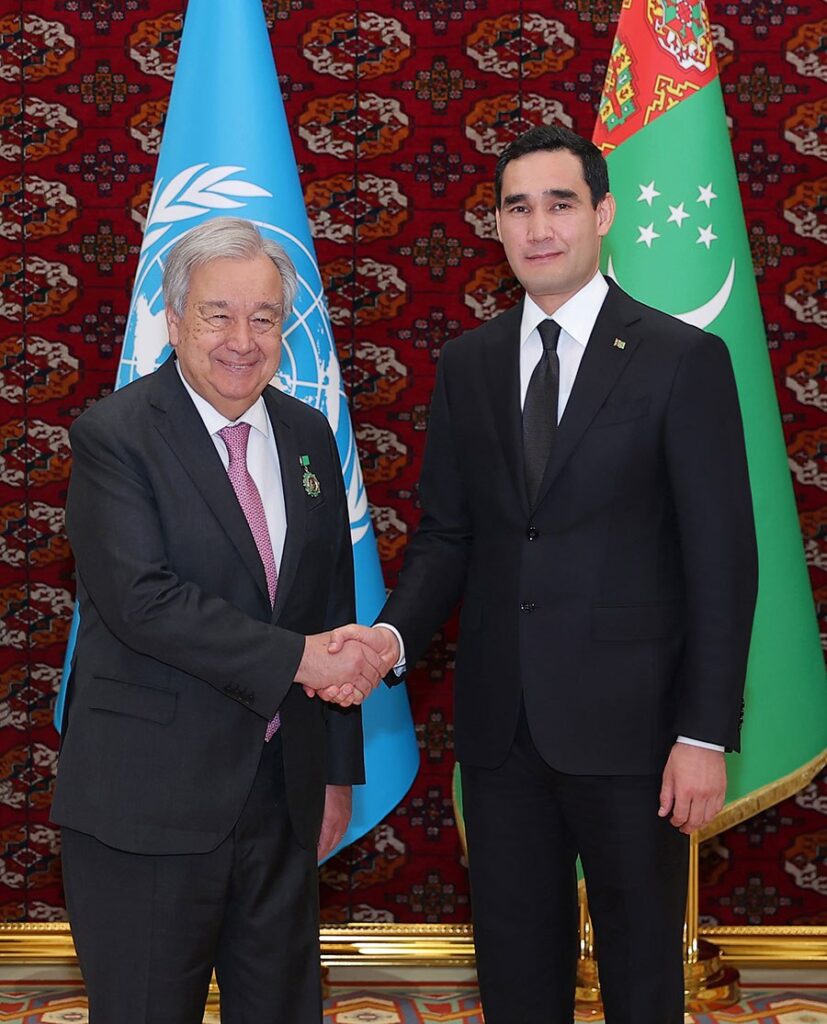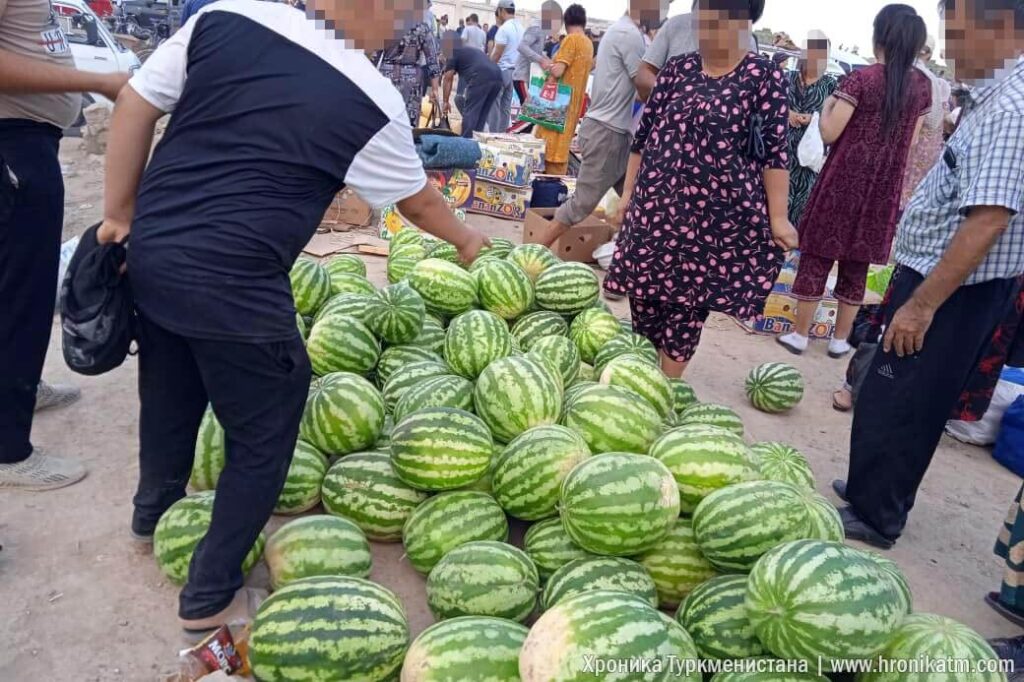Viewing results 1 - 6 of 743
On July 25, Kyrgyzstan hosted the 6th meeting of the Kyrgyz-Turkmen intergovernmental commission on trade, economic, scientific, technical, and humanitarian cooperation, chaired by Kyrgyzstan’s Deputy Chairman of the Cabinet of Ministers—Bakyt Torobaev, Minister of Water Resources, Agriculture and Processing Industry, and Annageldi Saparov, Minister of Energy of Turkmenistan. The parties noted the sevenfold increase in trade turnover between Kyrgyzstan and Turkmenistan over the past four years and discussed means for further improvement. In 2023, bilateral trade totalled $64 million. Torobaev proposed opening a joint bonded zone in Turkmenistan to develop trade infrastructure and postal operations in e-commerce. He also noted that providing preferential tariffs for Kyrgyz cargo trucks through Turkmenistan's territory and simplifying the visa procedure for Kyrgyz drivers will significantly expand bilateral trade exchange. Due to their geographical locations, the parties emphasized that Kyrgyzstan and Turkmenistan have significant potential in the transport and logistics sector. In particular, the planned launch of a transport corridor from China through Kyrgyzstan and Uzbekistan to Turkmenistan, utilizing the Turkmenbashi seaport, will provide access to the Caspian Sea and the Russian Federation, opening up new economic opportunities for both countries. The meeting addressed the need to continue working on creating a Kyrgyz-Turkmen Development Fund as a mechanism for uniting the two countries' business sectors and stimulating the creation of joint ventures. The parties also discussed a project to build a Turkmen resort in Cholpon-Ata at Lake Issyk-Kul. The Kyrgyz government’s press service stated that the parties signed documents on Kyrgyzstan's import of Turkmen electricity in 2025 but did not disclose details.
On July 20, government representatives from Kazakhstan, Turkmenistan, and Afghanistan gathered in Aktau, Kazakhstan, to discuss the construction of a new railway line running from the Turkmenistan border through Afghanistan to Pakistan via Turgundi—Herat—Kandahar—Spin Buldak, The joint implementation of the project was proposed by head of the Agency for Transport and Communications of Turkmenistan, Mammetkhan Chakyev, who also announced that Turkmenistan and the Afghan side had already agreed to create a logistics centre in Turgundi, a border town in northern Herat Province of Afghanistan. Construction is due to commence shortly and once in operation, will provide facilities for the transhipment of grain, rail containers, and other cargo. Kazakhstan's invitation to participate in the project rests on its production of high-quality railway tracks and as stated by Chakyev, “Turgundi-Herat is not only the construction of a railway but also the further development of freight traffic and the attraction of goods in this direction. With the participation of the Kazakh side, we can significantly increase the attractiveness of this corridor." Afghan representatives stating their readiness to forward the transport of goods from Kazakhstan and Turkmenistan to Pakistan, highlighted the effectiveness of the route for all concerned as well as the benefits it afforded to importing Chinese goods through Kazakhstan and Turkmenistan. Kazakhstan’s Deputy Prime Minister Serik Zhumangarin announced his support for Turkmenistan's proposal for the joint construction of the new railway route and its provision of a western corridor from Afghanistan to Pakistan and India.
The capital of Turkmenistan is hosting a two-day seminar , organized by the OSCE Centre in Ashgabat, on "Artificial Intelligence and its Impact on Freedom of Speech." During the event, international participants, including specialists from Austria and Bulgaria, will analyse the impact of artificial intelligence (AI) technologies on freedom of speech and the role of the media in today's world through various workshops focusing on: the role of artificial intelligence in shaping public opinion and disseminating information; the risks and opportunities associated with the application of AI in the media; how to ensure freedom of speech in the context of AI development; and how to combat misinformation and manipulation in the age of artificial intelligence. Opening the seminar, William Leaf, Representative of the OSCE Centre in Turkmenistan, emphasized the importance of freedom of speech and media as integral elements of a democratic society. Noting Turkmenistan's growing interest in developing artificial intelligence, he welcomed the seminar as an important step in understanding its potential and possible challenges. Within the context of an exchange of views and the development of recommendations on the use of artificial intelligence in the media, the event provides a platform for discussions on how such issues affect the principles of freedom of speech and human rights and as such, relates to the OSCE Centre's ongoing assistance in implementing the National Human Rights Action Plan 2021-2025 (NHRAP) provisions on media freedom and freedom of expression.
Turkmenistan citizens graduating from foreign universities, are currently required to undergo a complex process to have their diplomas recognized in their home country. A source in the Main Department of Education of Lebap told Radio Azatlyk that Turkmenistan citizens graduating from pedagogical universities in CIS countries are obliged to enrol in a month-long advanced training course at the Pedagogical Institute in Turkmenabad to nostrify (recognize university qualifications) their diplomas and moreover, provide 17 references. According to graduates, the process also involves the extortion of bribes. Hakberdi, a Russian language teacher from Turkmenabad who underwent the diploma recognition process about five years ago, explained that the size of the bribe depends on the influential status of whoever is engaged to help. "From 2018 to 2019, the bribe could reach 10-15 thousand dollars. If you have an acquaintance in the ministry, the bribe will be smaller, but can rise if intermediaries are involved." In addition, when attempting to get their diplomas recognized, graduates can fall prey to fraudsters who promising help, take their money and disappear. In parallel with the season of diploma nostrification, the process of submitting documents and sitting exams for admission to foreign universities continues. Exams are taken online and because of internet issues, this can create new problems. "Since the speed of the Wi-Fi signal at home is inadequate," reported a resident of Dianev, "applicants from across the districts gather at the Turkmentelecom internet cafe in Turkmenabad but there are not enough computers and often queues from 6 a.m."
During his visit to Turkmenistan, the UN Secretary General António Guterres met President Serdar Berdimuhamedov to discuss strengthening cooperation in political, economic, environmental, cultural, and humanitarian spheres. President Berdimuhamedov emphasized Turkmenistan's aspiration to further develop relations with the UN. Noting the importance of the country's permanent neutrality in strengthening peace and security in the region, he recalled that on Turkmenistan's initiative, the UN General Assembly proclaimed 2025 the International Year of Peace and Trust. Guterres praised Turkmenistan's proactive approach to solving urgent problematic issues and remarked on the country's important role in ensuring universal peace, security, and sustainable development. He also recognized Turkmenistan's efforts to address the problem of statelessness, especially in Central Asia. During the talks, both sides stressed the prolonged nature of the strategic dialogue between Turkmenistan and the UN, based on common ground regarding the organization's goals and the country's national interests. Outlining the priorities of the Turkmenistan-UN strategic dialogue, the president highlighted ensuring global security, resolving regional situations, sustainable development, and other humanitarian issues. He also proposed to develop a Global Security Strategy based on preventive diplomacy for conflict prevention, expressing a readiness for close cooperation with all interested states and UN institutions. In the context of regional cooperation, the parties noted the growing importance of Central Asia as a critical center of global energy, geopolitics, and transportation.
Chronicles Turkmenistan reports that Iranian watermelons are now cheaper than those produced locally. Turkmen farmers were encouraged to plant watermelons on leased lands on the assurance that the crops would be irrigated at the state's expense. However, given the high volume of water required to cultivate the fruit and the need for farmers to irrigate their crops twice per season, only those with the means, could afford to pay for their own pumps. As stated in the publication's report, “-That- was not enough to get a good harvest. Also, the cost of production, including irrigation and other costs, was higher than expected." The vast stocks watermelons imported from Iran to markets in Meri and Lebap Velayats are significantly cheaper than local produce, selling at 4–5 manats (TMT) ($1.14–1.43) per 6 to 9 kilogram compared to 1.50 TMT ($0.43) per kilogram or an average of 7-8 TMT ($2– 2.29) per Turkmen melon. As a result, Turkmen farmers struggle to sell their produce and are suffering significant losses.






